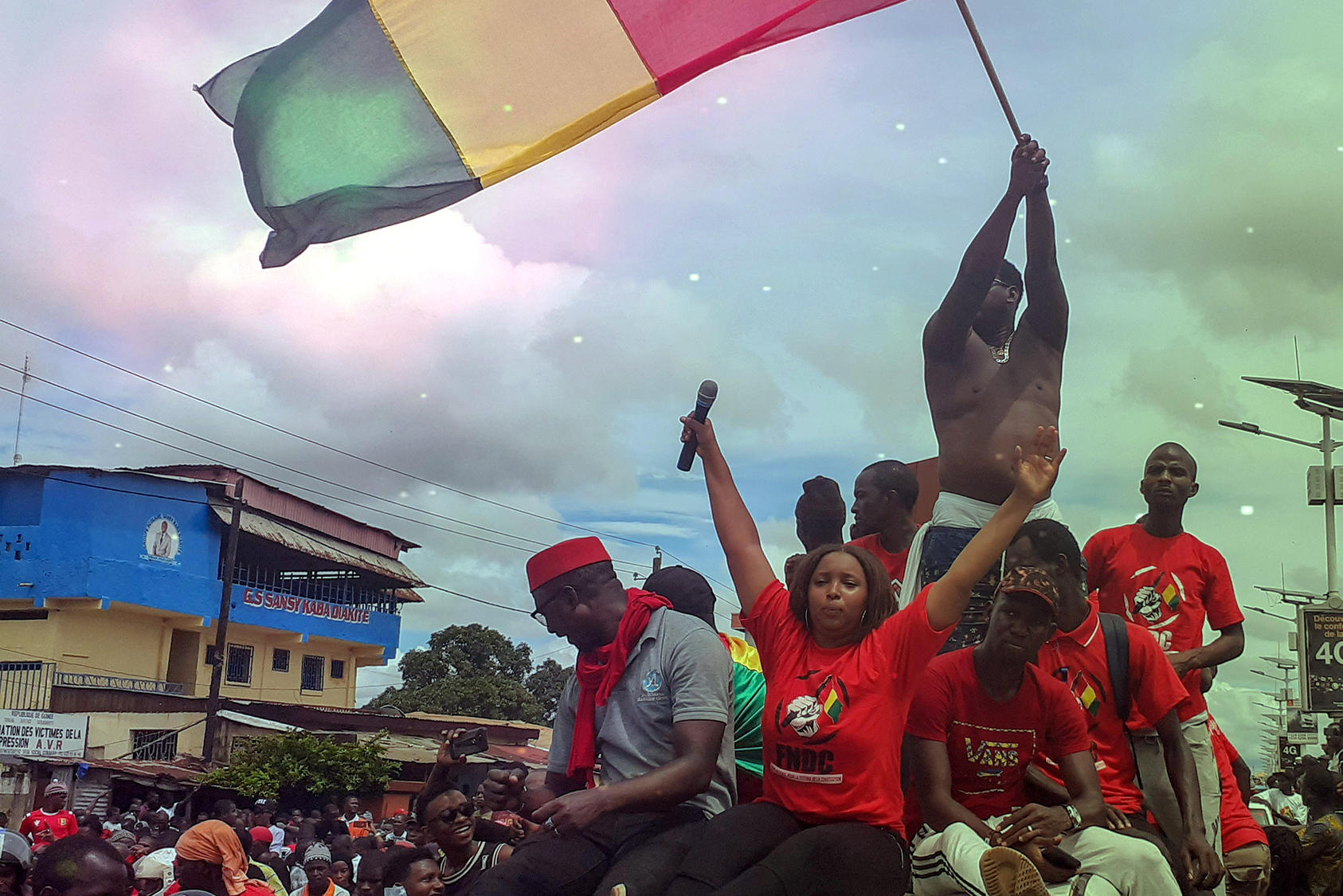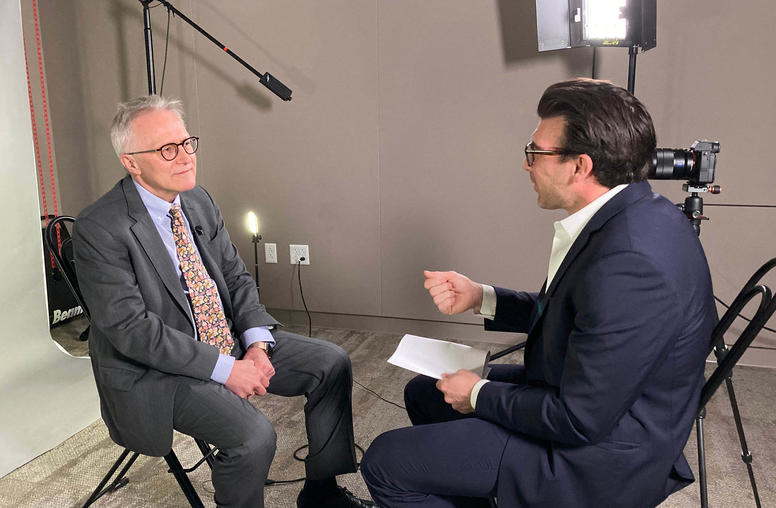A New U.S. Plan to Avert Wider Conflicts in West Africa
The Global Fragility Act updates U.S. efforts for peace in lands bordering the Sahel’s violence.
The United States is setting a new priority on building peace in five West African nations threatened by domestic crises and by violence that is spreading from the neighboring Sahel region. The White House named those countries among others in which to launch a new U.S. strategy to prevent violent conflicts in unstable regions. This choice signaled that stability in coastal West Africa is a vital U.S. interest — and that these five countries, while in varied stages of building democracies, can strengthen democracy and stability with more focused, long-term U.S. support. A broad consultation of scholarly and policy experts on coastal West Africa is buttressing that idea.

High Stakes in West Africa
Nearly a decade of mass violence in West Africa’s landlocked states — Mali, Niger and Burkina Faso — has drawn U.S., European and U.N. troops into counterterrorism missions against the growth of ISIS and al-Qaeda affiliates. A metastasis of the Sahel crisis to the five adjoining coastal states of Benin, Togo, Ghana, Côte d’Ivoire and Guinea would multiply the populations at risk from about 60 million to roughly 150 million.
The single metric of bilateral trade reflects the massive added cost that such expanded violence would impose on the United States: The five coastal countries provide $3.86 billion in America’s bilateral trade — more than 13 times the amount with the three landlocked states. The coastal states’ strategic importance is heightened because they dominate critical shipping lanes in the Gulf of Guinea, where maritime piracy and other transnational crimes are rising.
Effectively, coastal West Africa is perilously close to slipping into widened violence—both from conflicts rooted at home and from a growing pattern of attacks linked to the Sahel. A 2021 USAID assessment found that the coastal states are “quickly approaching” conditions of persistent terrorist insurgency.
In the past year, several coups d’état — notably in Mali, Burkina Faso and Guinea — have reinforced the warning sign offered by extremism: Poor governance in many West African countries is failing to meet the needs of national citizenries, especially youth. This can produce “fragile” states, inviting violence — whether insurgencies or military coups — that risks scuttling efforts to build peaceful democracies. USIP consultations with West African and other experts underscore that part of America’s new strategy will need to build better post-coup transitions back to civilian rule, focusing on the quality of transitional periods rather than simply insisting speedy transitions that fail to address underlying weaknesses in governance that produced coups (or other violence) in the first place.
The five coastal West African states include full and partial democracies, and authoritarian governments. The region, which once led the continent’s democratization efforts and achieved relative stability, is seeing some of the world’s steepest declines in democratic norms, as measured in the annual Freedom in the World reports by the research group Freedom House.
- Benin has seen the government impose electoral restrictions to exclude opposition parties, and internet closures and police violence to quash protest.
- A single family effectively has ruled Togo since 1963, while a calcified political opposition offers few alternatives. Togolese communities, notably in the north, as well as youth are increasingly marginalized and public-sector corruption has increased.
- Ghana offers a democratic model, but suffers problems common to the coastal states. One is a lag in the economic and human development of the northern interior versus the southern coasts; another is the challenge of providing education and opportunity equal to the needs of burgeoning youth populations, whose marginalized members are increasingly at risk of radicalization. A third is incursions by extremists from the Sahel.
- In Côte d’Ivoire, economic recovery since the violent political crises of 2010-2011 has partly restored the country’s role as a driver of growth in the region, but ethnic and land disputes remain unresolved, posing risks for renewed violent conflict.
- Guinea’s democracy is eroded. Former President Alpha Condé used a dubious constitutional referendum and a disputed, violence-marred election to claim a third term in office over popular opposition. The army’s coup in September now poses a conundrum as Guineans and partners seek a path for restoring civilian rule and strengthening democracy.
West Africa’s Potential, U.S. Partnership
The White House announced last week that the five coastal West African nations form a high-priority region for new U.S. efforts to build peace and stability under its new strategy mandated by the 2019 Global Fragility Act. While several of the priority nations for this effort (which also targets Haiti, Libya, Mozambique and Papua New Guinea) are suffering or recovering from full-blown civil wars, the main task in coastal West Africa is to prevent that scale of violence.
“Prevention is hard work — measured not in days and weeks, but in years and generations,” President Joe Biden wrote in describing the new strategy. “Its successes are never as evident as its failures, and it requires us to remain focused on lasting peace and stability over the allure of easier, more temporary gains.”
That long-term commitment, across a more comprehensive, coordinated and multilateral effort, is what the USIP-convened Task Force on Extremism in Fragile States envisioned to improve on years of disappointing progress achieved by international and U.S. development and peacebuilding efforts in fragile states. The new strategy will commit to supporting 10-year initiatives of better coordinated economic and human development assistance, with greater emphasis on improving governance, as opposed to narrower approaches that have relied too heavily on military operations to quell extremist violence and insurgencies.
USIP last year convened consultations with civic leaders and scholars in the five coastal West African states targeted by the new U.S. plan, and recently created a diverse, nonpartisan study group of West African and U.S. experts, business leaders and former senior officials to better pinpoint the risks for violent conflict in each country. This “senior study group” will identify specific steps that the United States and other international partners can take to support coastal West African governments and civil societies in resolving the underlying problems —unequal, inadequate development, marginalized communities, weak institutions of accountability and others — that undermine democracy and stability in the region.
Directions for Progress
Africans’ own themes in discussing ways to build peace suggest directions for a successful strategy. These would:
- Begin by making democracy a greater priority, with a more consistent, coordinated strategy and programs. For international partners such as the United States, this would include avoiding steps that would risk inadvertently undermining democratization efforts because of a focus instead on geostrategic rivalry with China.
- Lead with investment. Where past practices often have strayed into presenting democratization as an American-defined ideal, the new strategy should present local democracy and accountability as a powerful way for African nations to attract the private investment that they emphasize as their top priority to achieve desperately needed economic and human development. U.S. policies should promote investments designed to avoid damaging communities and worsening local conflicts, as many projects — notably in extractive industries — have done.
- Leverage trade, notably through the still-young African Continental Free Trade Area, among 55 African Union member states. Like investment, this initiative offers hope for accelerating the economic growth essential to meeting populations’ needs and permitting democratization.
- Reform international security assistance that may have inadvertently facilitated coups, and target U.S. support at building better human, rather than state, security.
- Buttress the prodemocracy mechanisms of regional groupings such as the Economic Community of West African states and African Union, notably in preventing, and responding to, military coups.
- Build better transitions to democracy when coups occur, through inclusive national dialogues that can shape local prodemocracy reforms, clarify the role of the military, and help civilian governments better meet the needs of their people. And lend greater support to civil society in countries at risk of coups.
- Harness the energies of youth. In a recent USIP discussion forum online, youth prodemocracy activists from Guinea, Togo and Nigeria underscored the disproportionate gains that can be achieved by even modest investments in helping youth-led movements for change.
In coastal West Africa, Americans will need to work with local governments, communities and civil society in each country to shape responses to the specific problems that risk undermining peace and stability. One step, U.S. and other experts say, is to boost U.S. diplomatic resources to engage in the region, notably with the Economic Community of West African States. It will be vital to mesh the new U.S. effort with such African partners, including the Accra Initiative against crime and violence—and with regional prodemocracy efforts by Britain, Germany and other international partners. In many respects, building the new U.S. strategy with such partners will require giving new listenership to the voices of Africans themselves.



